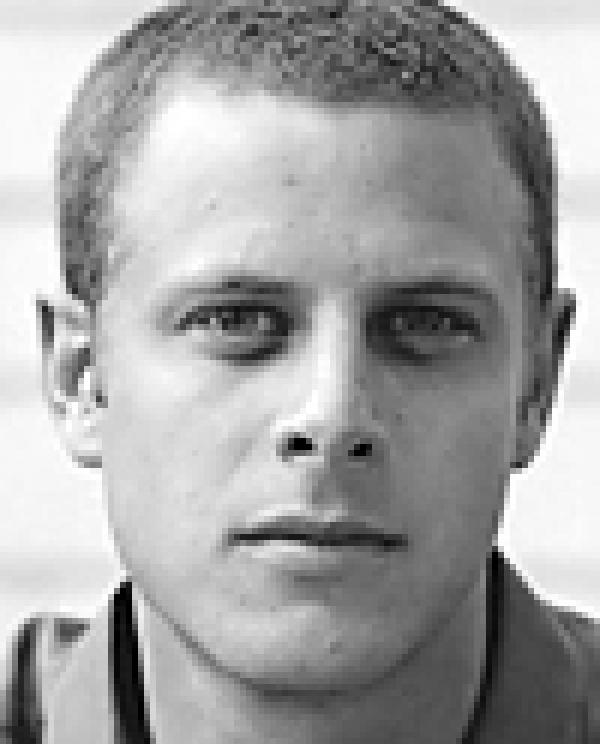Josh Barkan

Bio
Joshua Barkan has taught writing at Harvard and Boston University. He is the author of the collection of stories Before Hiroshima (Toby Press).Photo by Steven Smith
Author's Statement
I am still at the early stages of my writing career. With one book out, and a second book closer to completion, what the NEA grant means to me is: time and courage. I will use the time to edit the draft of a novel for publication. Time will allow me to think and work in a concentrated effort. The grant also gives courage. There are some writers who receive this award who have already won the Pulitzer, but for those of us who are still less famous, the support of peers on the writing committee is more important than money.From the short story "Before Hiroshima"
The bombings were continuing in Osaka, Kobe, Nagoya, Himeji and Wakayama. One of our intelligence posts had been moved from Osaka to our own at the end of the fourth year of the war, the attacks were so ferocious there. Few cities of importance had not yet been bombed by the end of the war, and most of the secondary targets had been touched or destroyed as well. Numbers and symbols dashed across the brown paper in the teletype machine. The class of each group of bombers was cited, the quantity of planes, the height of enemy strikes and the success of any of our anti-aircraft fire as well as the calculated weight of bombs dropped and the expected damage. As the sheets jerked forward I scanned each list. By this time in the war the code was second nature to me. Nevertheless, the rhythm of the teletyper was too hypnotizing for me to force any careful scrutiny until morning, no matter how hard I tried.
And yet, although the jumble was too dense to rapidly dissect, a large number suddenly stood out from among the other slashes and dots, characters, parentheses and stars, as if a drop of blood shining brightly, fresh vermilion, in a field of snow. A bomb weighing an estimated two thousand three hundred kilos - a single bomb - had been dropped over Kobe near the center of the harbor, with only a few other smaller accompanying bombs. I put on my glasses and studied the number. Perhaps I had misread the zeros behind the twenty-three. I ordered Takayama over, one of the two other operators in the room who had been playing cards during the print-out, and asked him to look at the number too. He confirmed the figure and I told him to wire the source in Kobe. The source repeated the information, adding a damage description with a note that the planes which dropped the bomb had been flying very high when the bomb was released. The source asked for any action to take. I replied none at the moment but that someone would be down the next day to inspect the site. A few minutes later I put on my cap, and I combed my hair with my fingers. I rubbed the sleep out of my eyes and kneaded my cheeks to regain some color. I hurried to the far end of the palace, through the dark rooms of the old Shogun Ieyasu's meeting halls and across the various other inner courtly chambers. The palace was silent and delicate. The flower arrangements, scrolls, screen paintings, swords and cushions were all neatly ordered and faintly glowing in the bluish-white moonlight, yet there was a firmness too, a solidity to the wooden floorboards. Near Mizuoshi-san's chamber I slowed until I could no longer hear my footsteps. Mizuoshi-san insisted I report everything significant to him immediately. At least six or seven times before I had woken him up, after the first surprise bombing of Tokyo for example. Usually, I knocked on his paper door firmly but softly, then I waited in his hallway until he put on his nemaki coat, and then he ordered me in. But on this night I hesitated before knocking. A powerful smell of sake emanated from his room, and I knew he did not usually drink but that when he did he did not stop until he passed out. I turned to leave, but "Who's there?" he shouted. The floorboards had creaked. "It's me," I said hoarsely. I cleared my throat. "Why didn't you identify yourself earlier?" I knew he wanted no response so I waited quietly outside. At last, he opened his screen door, but unlike the other times he did not invite me in. He stood face to face with me, a few raw gray whiskers sticking out, highlighted by the moon. His firm jaw and heavy chest - covered with a stained undershirt - poked toward my skinny frame. His cheeks were red. Sharp lines ran across his sleep-creased face. "What is the news?" he demanded. "A large bomb has been dropped over Kobe. The flight pattern of the enemy is unusual." "What was destroyed?" "An area the size of fifty-two normal bombs. An entire long dock with a material shed and small barracks." Mizuoshi-san breathed heavily into my face. "And this is why you have come to me in the middle of the night?" I bowed like a dog trying not to be caned. "For false reports?" My lips tightened, my face still down. "I am sorry to have disturbed you," I said. "I did not want to bother you, but the source in Kobe confirmed the report." Mizuoshi-san stumbled closer to me. He spoke with slurred yet sharp speech. "Then the source in Kobe has confirmed an error twice." Spit flew from his lips onto my forehead and he tugged my ear until it stung. He staggered back and shut his door. I inched away from his chamber quietly. And then I moved to my own quarters to nurse my ear in cold water and to sleep.

